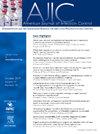Impact of hand hygiene interventions on handwashing practices and microbial risk: A study in an orphanage-based school in Pakistan
IF 3.8
3区 医学
Q2 INFECTIOUS DISEASES
引用次数: 0
Abstract
Background
Orphaned children are often deprived of quality care, making them more susceptible to diseases due to inadequate hand hygiene. The study aimed to assess the prevalence of hand hygiene practices and detect bacterial loads on children's hands before and after hygiene interventions in an orphanage school.
Methods
The study enrolled all the orphan children registered with the Save Our Souls children’s orphanage school in Pakistan. Handwashing practices and swab samples from the hand was collected to evaluate the impact of hand hygiene practices on bacterial load. The Quantitative Microbial Risk Assessment model was used to predict the health risk.
Results
The study identified the 2 most common bacteria: Staphylococcus aureus and Escherichia coli. The bacterial contamination was significantly reduced after the intervention (S aureus 166 Colony-forming unit (CFU) /mL and E coli 185 CFU/mL). The higher bacterial ingestion rate was attributed to hand contamination and increased bacteria transfer from hand to mouth.
Conclusions
The multicomponent hand hygiene intervention showed improvement in accessibility to hand hygiene resources and practices. The findings underscore the need for hygiene interventions in orphanage schools to improve health and educational outcomes.
手部卫生干预措施对洗手方法和微生物风险的影响:巴基斯坦一所孤儿学校的研究。
背景孤儿往往得不到高质量的照顾,因此由于手部卫生不足,他们更容易感染疾病:本研究旨在评估手部卫生习惯的普及率,并检测孤儿院学校卫生干预前后儿童手部的细菌量:本研究招募了在巴基斯坦 "拯救我们的灵魂"(SOS)儿童孤儿院学校注册的所有孤儿。采用世界卫生组织的标准检查表评估洗手方法,并采集手部拭子样本,以评估干预前后手部卫生习惯对细菌量的影响。采用微生物风险定量评估(QMRA)模型预测健康风险:结果:研究发现了两种最常见的细菌:金黄色葡萄球菌和大肠杆菌。在接受干预前,干预组(1261 CFU/手)和对照组(1008 CFU/手)的儿童手部都存在金黄色葡萄球菌污染,而干预组(1042 CFU/手)和对照组(1798 CFU/手)的儿童手部都普遍存在大肠杆菌。干预后,细菌污染明显减少(金黄色葡萄球菌 166 CFU/ml,大肠杆菌 185 CFU/ml)。细菌摄入率较高的原因是手部污染和细菌从手到口的转移增加:结论:多成分手部卫生干预措施的实施表明,手部卫生资源和做法的可及性有所改善。研究结果表明,有必要在孤儿院学校采取卫生干预措施,以改善健康和教育成果。
本文章由计算机程序翻译,如有差异,请以英文原文为准。
求助全文
约1分钟内获得全文
求助全文
来源期刊
CiteScore
7.40
自引率
4.10%
发文量
479
审稿时长
24 days
期刊介绍:
AJIC covers key topics and issues in infection control and epidemiology. Infection control professionals, including physicians, nurses, and epidemiologists, rely on AJIC for peer-reviewed articles covering clinical topics as well as original research. As the official publication of the Association for Professionals in Infection Control and Epidemiology (APIC)

 求助内容:
求助内容: 应助结果提醒方式:
应助结果提醒方式:


